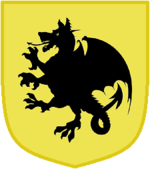Prince of the Calbain: Difference between revisions
| Line 113: | Line 113: | ||
|| [[File:Prince Arthur III.jpg|90px]] | || [[File:Prince Arthur III.jpg|90px]] | ||
|| [[Arthur III]] | || [[Arthur III]] | ||
|| | || ''Hand of Peace'' | ||
|| 1690–1730 | || 1690–1730 | ||
|| Sherrinford-de Montfort | || Sherrinford-de Montfort | ||
| Line 122: | Line 122: | ||
|| [[File:Deiniol.png|90px]] | || [[File:Deiniol.png|90px]] | ||
|| [[Deiniol]] | || [[Deiniol]] | ||
|| | || ''The Shortlived'' | ||
|| 1730–1733 | || 1730–1733 | ||
|| Verion de Montfort | || Verion de Montfort | ||
Revision as of 20:14, 26 June 2024
| |||||||||||||||
The Prince of the Calbain (Calbic: Tywysog y Calbain) is the title for the ruler of the Calbain people. The Prince of the Calbain is the ceremonial head of state of Calbion and, although the office holds little power, is considered the father of the nation.
The current prince is Deiniol (since 1730).
History
The position of the Prince of the Calbain originated in the 15th century in the period of Calbain tribes. Originally an elected tribal position, the Prince of the Calbain developed quickly into an inherited position. In the late tribal years, and the early years of the Calbain state, the Prince of the Calbain was an absolutist ruler. Following the 1630s, the role of the Prince became more ceremonial, with its political powers being limited by the rising importance of the Governor-General.
Role in Calbain society
The Prince of the Calbain used to have a position of significant political power until the death of Jack I. The successive Princes saw their political role become highly limited, especially following the democratic reforms and the institutionalisation of the elected Cynulliad Cenedlaethol and the High Council. Currently, the Prince of the Calbain is a mainly symbolic office, representing national unity and transcending political differences. As such, the office of Prince is widely regarded in a positive light by the Calbain people.
Investiture
Upon the death of their predecessor, the designated Prince of the Calbain first undergoes a traditional ritual which is known as the investiture. In this highly religiously significant ceremony, the future Prince is stripped of all his former titles, offices and possessions, only to emerge as the symbolic leader of the Calbain people, to whom his life and work is to be dedicated going forward.
List of Princes of the Calbain
| No. | Portrait | Regnal name | Epithet | Reign (in AN) | Dynasty | Era | Notes |
|---|---|---|---|---|---|---|---|
| 1. | 
|
Owain | The Great | 1492-1520 | Gwynnedd | First Era | First Prince of the Calbain in recorded history, assumed the title immediately following the Fall of Jasonia. |
| 2. | 
|
Llywelyn I | Y Cyntaf | 1520-1524 | Gwynnedd | First Era | Attempted to resist the Matbaaic colonisation, worked with the Britannic forces on Kilkelly. |
| 3. | 
|
Arthur I | The Martyr | 1524-1530 | Gwynnedd | First Era | Crucified by the Matbaaic government after a failed rebellion |
| 4. | 
|
Llywelyn II | Tad y Genedl | 1530-1544 | Gwynnedd (until 1539) Llyweldûr (from 1539) |
Second Era | Led a succesful uprising against the Matbaans in 1539, installed Calbain rule for three years until the War of Jeremy's Nose resulted in Batavian colonisation of the islands. |
| 5. | 
|
Arthur II | The Judge | 1544-1561 | Llyweldûr | Second Era | Founder of Llysthur, originally a fortified neighborhood of Enhasa. Worked together with the Nelagan government. Established a court system that is still the basis of Calbain law. |
| 6. | 
|
Laclan | The Silent | 1561-1565 | Llyweldûr | Second Era | Had very little power and attempted to keep the Calbain spirit alive by writing several historical works. |
| 7. | 
|
Dawydd | The Last | 1565-1569 | Llyweldûr | Second Era | Last Prince of the Calbain until the restoration. |
| 8. | 
|
Jack I | The Good | 1597-1600, 1608-1628 | de Montfort | Third Era | Of South Batavian descend, oversaw the re-establishment of Calbion. In exile from 1600 to 1608 following the unsuccesful revolt. Established the modern Calbain state. |
| 9. | 
|
Jack II | O'r Gwaed | 1630-1690 | Sherrinford-de Montfort | Third Era | Following the death of Jack I during a voyage to the Calbain colonies in Corum, a search ensued to find a living relative. Having never married, Jack I did not leave an issue, and his close family had been purged following the independence war. After a search that lasted almost two years, a distant cousin was found in a noble family in Kilkelly that was of shared Britannic and Batavian heritage. Longest reigning Prince of the Calbain in history. |
| 10. | 
|
Arthur III | Hand of Peace | 1690–1730 | Sherrinford-de Montfort | Third Era | |
| 11. | 
|
Deiniol | The Shortlived | 1730–1733 | Verion de Montfort | Third Era | Assassinated in the third year of his reign on the floor of the Cynulliad Cenedlaethol |
| 12. | 
|
Jack III | 1733–current | de Montfort | Third Era | Was granted emergency executive powers, first Prince with political power since Jack I |
